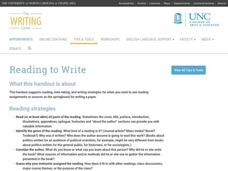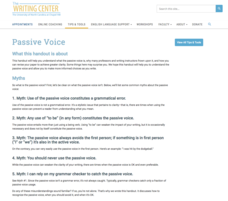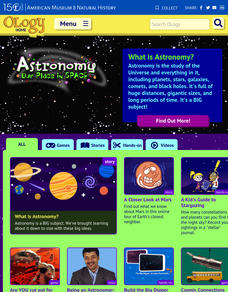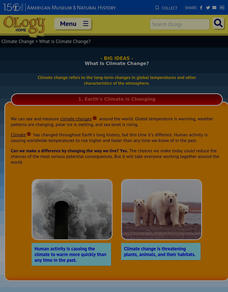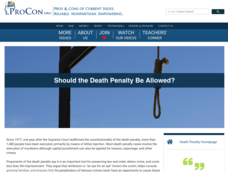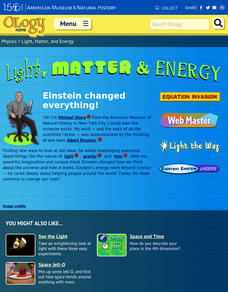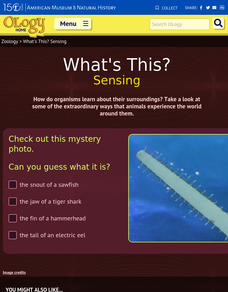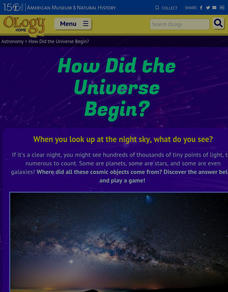University of North Carolina
Reading to Write
Silly journal and essay prompts may be fun to write, but they don't model the kind of writing needed for college papers and standardized tests. The 15th part in a series of 24 covers the concept of reading to write—during and after...
University of North Carolina
Passive Voice
Why was the road crossed by the chicken? Because the writer forgot to write in active voice. Many myths surround the use of passive voice. Thankfully, an informative handout explains how to recognize passive voice and when it's okay to...
Smithsonian Institution
Cold War
The Cold War was not necessarily always cold in temperature, but the relationship between the United States and the Soviet Union sure was frigid! Scholars read various passages, view exhibition graphics, and observe an artifact from the...
American Museum of Natural History
Space and Time
Carve out some time to learn about space-time. Young scientists use a remote learning resource to read up on the relationship between space and time. They consider the idea of relativity, see how objects with a large mass can bend space...
American Museum of Natural History
Planetary Mysteries
A website all about planetary mysteries—it's a one-stop-shop for all things, stars, planets, and space travel. Scholars read an astronomy overview to discover the page's big ideas, then choose from the plethora of resources, including...
Curated OER
Climate Change
Rising sea levels, strong storms, melting ice ... who or what is to blame? Scholars browse the website in preparation for a class discussion or debate about whether human activity is causing climate change. They gain a balanced...
Shakespeare Globe Trust
Much Ado About Nothing
Love, deception, witty bante—that's much ado about a lot! As learners navigate the resource, they view an interactive character map and read character biographies from Shakespeare's Much Ado About Nothing. Pupils also...
American Museum of Natural History
What Is Climate Change?
So many factors show that climate change has arrived. Learners read through an online resource that explains the data and the consequences of climate change. They also review strategies for slowing or even reversing the global influence.
Shakespeare Globe Trust
Othello
Emilia mocks Bianca, who is in a relationship with Cassio, who attacks Montano. Using the resource, learners explore profiles of the characters from Shakespeare's Othello. They also read a scene-by-scene synopsis and follow a weekly blog...
ProCon
Cuba Embargo
President John F. Kennedy bought 1,200 Cuban cigars the night before he enacted the Cuban trade embargo in 1962. Should the United States maintain the embargo? Using the website, pupils explore the topic to prepare for a class debate or...
ProCon
Daylight Savings Time
An entomologist named Geroge Vernon Hudson is credited with proposing Daylight Saving Time (DST) so he could better study his insects. Using the informative website, scholars read a brief introduction to the topic and then explore the...
ProCon
Death Penalty
Should the United States continue the practice of capital punishment? Scholars set out to answer the question in preparation for a class debate or discussion about the death penalty. They watch videos, analyze charts about death penalty...
American Museum of Natural History
Wonderful World of Wasps
Shockingly, wasps sometimes challenge lions as the king of predators! Learners explore the life of a wasp in an interactive online lesson. They read about the characteristics of wasps and then complete activities to learn about their lives.
Judicial Learning Center
Getting Ready for Trial
A courtroom can be a scary place for the uninitiated. Get familiar with the process using a helpful overview of the activities that take place prior to both civil and criminal cases. The lesson explains the differences between...
American Museum of Natural History
Light, Matter and Energy
Let Einstein's work shine the way. Pupils read about Einstein's iconic equation, E=mc^2, using a remote learning resource and see how ideas from other scientists such as Kepner, Curie, Galilei, and Newton led to its discovery. They...
American Museum of Natural History
What's This? Sensing
There is a scallop that relies on sight so much that it actually has more than 100 eyes! There are many species that rely heavily on one sense or another. An online interactive resource has youth read about several of these animals. The...
American Museum of Natural History
How Did the Universe Begin?
The Big Bang Theory is more than a television show. Pupils read how Edwin Hubble observed other galaxies and noticed that the galaxies are moving away from each other. Scholars learn about the idea of the big bang and what happened next...
iCivics
County Basics
To understand the concept of a county government system, scholars read a short passage, view a helpful visual aid, use the web to conduct some research about their local areas, and then answer related questions online.
American Museum of Natural History
Einstein in Time
Einstein sure had an interesting life. Using a remote learning resource, pupils examine a timeline of Einstein's life. They learn about the major scientific discoveries as well as humanitarian and social work. Additionally, they read...
University of North Carolina
Modals
If you could have any job in the world, what would it be? Modal verbs such as could and would express possibility, as the installment of a compilation of informational handouts describes. A series of tables help explain the strength,...
American Museum of Natural History
Trip Up Your Brain
Sometimes different parts of the brain disagree. See what this disagreement looks like using a remote learning resource to experience how brains often take shortcuts. Pupils complete the activity, observe their results, and then read...
University of North Carolina
Communication Studies
A degree in communications incorporates disciplines such as business, law, and media as well. A writing handout offers prospective communications majors information about what kind of assignments to expect in a typical course....
Judicial Learning Center
Your 4th Amendment Rights
Americans love to learn about their rights, especially those that protect them from the government's power to invade their privacy. Young people are especially engaged by this topic. An informative lesson explores four Supreme Court...
Judicial Learning Center
Your 1st Amendment Rights
Why should classes care about the First Amendment? An engaging lesson serves as a powerful tool for answering just that. As all four cases in the lesson relate directly to freedom of expression in schools, young scholars explore the...
Other popular searches
- Active Reading Strategies
- Active Reading Guide
- Active Reading Charts
- Active Reading Homeostasis
- Active Reading Journal
- Active Reading Non Fiction
- Critical Active Reading
- Active Reading Lessons
- 6 Active Reading Strategies
- Active Reading Strategies
- Active Reading of an Article
- Common Core Active Reading
